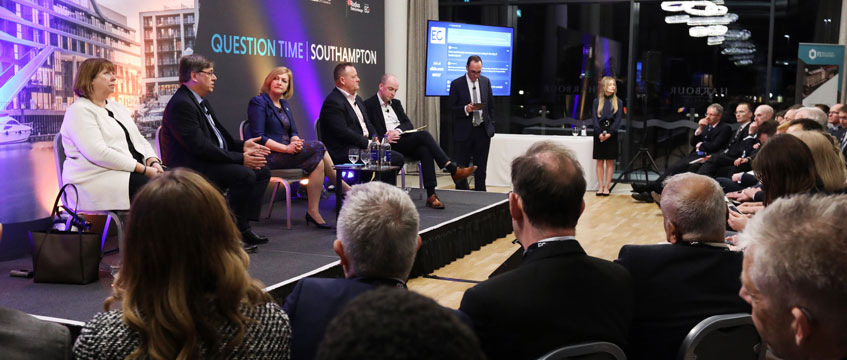Southampton’s dearth of quality office space looks set to continue after recently appointed city council chief executive Sandy Hopkins indicated at EG’s Southampton Question Time that building new office blocks in the city was not a top priority.
“I don’t agree that we should get hung up on building lots of office blocks,” she said, adding that she doesn’t have an office but instead works either from home or in Southampton’s coffee shops.
She admitted, though, that working in this way had some disadvantages when it came to needing privacy, adding that she had to decamp to her car for phone calls and that finding meeting space was challenging.
Hopkins added that she thought that public services, such as the universities, needed to lead and share their premises and working environments as the city looks to embrace the future.
Space issue
Her views on developing office space in the city came as fellow panellist Nick Jones, director of cost and project management and head of the Southampton office at Aecom, pointed out that there was an employment space issue in the city.
In recent times, he said, development sites that would have had office space on them had all been given over to student accommodation and that, other than one scheme by FI Real Estate Management, there was not another site with permission for new office buildings in Southampton or any in the planning process that he was aware of.
“Even if an occupier came, there is no product and there wouldn’t be any product for at least two and a half years from a standing start, and no business thinks that far ahead.”
He added that, when talking about employment, people always initially think of offices, but there’s actually a whole range of employment types, although councils have a tendency to take a “dim view” of logistics and industrial uses.
As a result, finding sites where they can match the demand and build the employment space is difficult for developers, he said.
“It’s a fast-moving environment,” he continued, so developers need to know what to build, and if they build it whether it will become a “white elephant”.

Losing out
Martin Hastelow, Savills’ head of office for Southampton, expressed his concern that if something wasn’t done with regard to creating office space, Southampton would lose out to other areas.
For example, he said the government hub programme had had a marked effect in areas housing them, particularly on the local office markets, and he warned that Southampton was in a position where if it was “not careful then those government departments will disappear from down here into those hubs elsewhere”.
People living and working in city centres created footfall and supported restaurants and retail, he argued, adding, “We think there is the demand [for office space] there.”
However, Hastelow admitted that mixed-use schemes are currently needed to subsidise office development in Southampton, as there was little appetite from funders who want proof that the building will be leased and generate a return.
“Once we get a few deals at around £25 per sq ft for offices, the case for new-builds will be better,” he said. “We have potentially got sites. There’s a lot of talk about repurposing retail, particularly on secondary parts of the high street and fringe-of-town big-box retail. There’s all sorts of sites that can be used, but it’s having the policy to protect some of these sites.”
Existential question
But will we need offices and logistic space in the future? Not according to Dame Wendy Hall, regius professor of computer science at the University of Southampton, who questioned why the panel were wanting to build offices at all.
“The sorts of jobs that we have in regular offices today are going to go,” she said. “The sorts of things that AI will replace are repetitive jobs that office workers tend to do.
“We’ve absolutely got to invest in education to get the kids today fit to work in the new industries which will be much more about knowledge working – much more about the understanding of and working in the digital world. I don’t see the point in building lots of offices.”
She added that space on the high streets should be given over to housing to create communities for the future. In addition, she said that investment should be happening now in transport pods.
“You talk about white vans, but it won’t be – it will be drones and pods [in the future]. White van man goes.”
She said that the way we move around will change “radically”, bar ships such as Southampton’s leisure-orientated cruise ships and container ships, as those will still be needed to transport physical goods around the world despite the digital advances.
“[Technology] is going to radically change our city layouts, and that’s what we’ve really got to get right.”

In the mix
Some developers, however, such as FI Real Estate Management, are looking at creating some office space within their schemes still.
In Southampton, the company is working in partnership with Southampton City Council to deliver two mixed-use schemes in the city, including the site of Southampton’s former Toys R Us store, close to the railway station.
David Thwaites, senior asset manager at FI Real Estate Management, said they had spent a long time masterplanning the site, which is just under 5 acres, to deliver a mixed-use scheme that could have around 70,000 sq ft of new office space within the first phase, which the council was keen on.
He added that he expected a planning application to be submitted in the summer, with a view to getting a decision by the end of the year.
Southampton City Council said last year that they planned to acquire the 17,281 sq ft Toys R Us store following the collapse of the retailer’s UK division, which saw all 105 of its UK stores close.
FI Real Estate Management is also developing its Nelson Gate scheme in the city, which will see three multi-storey office blocks – two of which have been largely vacant for an extended period of time – turned into a 144-bedroom hotel, 344 residential units, retail units, restaurants and 43,776 sq ft of office space.
Thwaites said FI Real Estate Management had looked at keeping the buildings as purely offices but “it just couldn’t be stacked up – we wouldn’t get funding for that”.
He added that FI Real Estate Management was building flexibility into its schemes as it had to cater to changing demands and ensure the viability.
Co-working solutions
Southampton City Council itself is investing in the creation of office space in the form of a serviced office provision within the Marlands shopping centre in the city centre. The 12,000 sq ft space will provide work areas for 70 co-workers and five individual offices. To date, the council has invested £1.5m in the project, which is replacing a vacant retail unit and is the type of office space for which its new chief executive is advocating.
Jones pointed out that in the past four years there were 2,000 additional tech employees working in Southampton, and he expected that the majority of them were working in offices.
The panel
- Dame Wendy Hall, regius professor of computer science, University of Southampton
- Martin Hastelow, head of office – Southampton, Savills
- Sandy Hopkins, chief executive, Southampton City Council
- Nick Jones, director of cost and project management and head of Southampton Office, Aecom
- David Thwaites, senior asset manager, FI Real Estate Management
- Chair: Damian Wild, Editor, EG
To send feedback, e-mail louise.dransfield@egi.co.uk or tweet @DransfieldL or @estatesgazette











